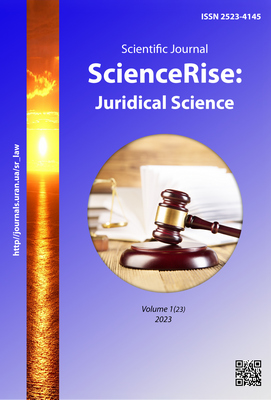Exploring the impact of stock theft in Dr. Pixley Ka Isaka Seme Municipality
DOI:
https://doi.org/10.15587/2523-4153.2023.275066Keywords:
community policing, stock theft, unemployment, Community, crime prevention strategy, organized crime, agriculture, livestock, economyAbstract
In terms of human sustenance, agriculture is the cornerstone of South Africa as it provides food to all citizens. The rearing of livestock is an important economic activity. Our dependence on livestock for daily consumption cannot be overemphasized. In 2020, the total income, generated from the sale of livestock, amounts to about 5.16 billion USD. While cattle sales alone amounted to about 3.12 billion USD, live chickens and sheep sales were in the region of about 1.01 billion USD. Due to high yielding revenue for the country, the government cannot afford to complacent with fighting criminal activities, directed towards jeopardizing the economy, which is still reeling from the impact of the Covid 19 epidermic. The increase in stock theft cases in some of the provinces in the country, in particular Mpumalanga Province, is a cause for concern. This needs urgent intervention from all the stakeholders, involved in the fight against crime. This article examines the Factors contributing to an increasingly high rate of stock theft in Dr. Pixley ka Isaka Seme Municipality, Mpumalanga Province. The study employed a qualitative research approach that used semi-structured in-depth interviews to collect data. The sample consisted of 22 participants, selected through purposive sampling, who included farmers, herdsmen, Community Police Forum members, and community leaders. The study found that there are several factors contributing to a high rate of stock theft, among others are poverty, unemployment, and poor relationship between the South African Police Service, which as a result render community members reluctant to be involved in the fight against stock theft. It was also found, that there are no regular weekly or monthly meetings taking place. There are no awareness campaigns between the police and community members to discuss the stock theft trends in Dr. Pixley Ka Isaka Seme Municipality
References
- Clack, W. (2014). What is Livestock Theft? The Diary Mail, 21 (8). Available at: https://journals.co.za/doi/abs/10.10520/EJC157607
- Mail & Guardian. Available at: https://mg.co.za/
- Geldenhuys, K. (2020). Stock theft: a costly cruel crime. Servamus Community-based Safety and Security Magazine, 113 (3), 16.
- Chelin, R. (2019). The growing threat of transnational livestock theft in South Africa. Enact. 14 November. Available at: https://enactafrica.org/enact-observer/the-growing-threat-of-transnational-livestock-theft-in-south-africa Last accessed: 15.12.2022
- Gouws, A. (2012). Goeie vooruitsigte ondanks kwellings. Landbouweekblad.
- Harvest SA. Available at: https://www.harvestsa.co.za/
- Saps. Available at: www.saps.gov.za
- Burchell, J. (2018) Principles of Criminal Law. Cape Town: Juta Press.
- Stock Theft Act 57 of 1959. Available at: https://www.justice.gov.za/legislation/acts/1959-057.pdf
- Statsa. Available at: https://www.statsa.gov.za
- Clack, W. (2019). Livestock theft statistics 2018/2019. National Stock Theft Prevention Forum.
- Mudyiwa, S., Gadzirayi, C., Mupangwa, J., Gotosa, J., Nyamugure, T. (2013). Constraints and Opportunities For Cultivation Of Moringa oleifera In The Zimbabwean Smallholder Growers. International Journal of Agricultural Research, Innovation and Technology, 3 (1), 12–19. doi: https://doi.org/10.3329/ijarit.v3i1.16044
- Doorewaard, C. (2015). Livestock theft: An analysis of the perpetrator – Part 1. Servamus: Community-based Safety & Security Magazine, 108 (3), 52–53.
- Dzimba, J., Matooane, M. (2005). Stock theft and human security. A case study of Lesotho. Available at: https://www.files.ethz.ch/isn/118322/113%20Full.pdf
- Doorewaard, C. (2020). Livestock Theft: A Criminological Assessment and Sample – Specific Profile of the Perpetrators. University of South Africa.
- Livestock theft a blow to KZN farmers (2016). IOL. African News Agency Reporter. Available at: https://www.iol.co.za/news/south-africa/kwazulu-natal/livestock-theft-a-blow-to-kzn-farmers-2010341 Last accessed: 15.12.2022
- Cornish, D. B., Clark, R. V.; Wortley, R., Mazerolle, L. (Eds.) (2008). The rational choice perspective. Environmental criminology and crime analysis. Cullompton: Willan, 21–47.
- Savard, D. M. (2018). A Routine Activity Approach: Assessing Victimization by Gender in Transit Environments and Other Public Locations. Advances in Applied Sociology, 8 (1), 56–75. doi: https://doi.org/10.4236/aasoci.2018.81004
- Lombard, W. A., Van Nicker, H. N., Mare, F. A. (2017). Assessing the economic impact of stock theft in the Eastern Cape province of South Africa. Available at: https://www.researchgate.net/publication/323424939_assessing_the_economic_impact_of_stock_theft_in_the_eastern_cape_province_of_south_africa
- Brandt, K. (2019). Forum: Livestock totaling R1.24bn stolen in SA. Eyewitness News. Available at: https://ewn.co.za/2019/12/31/livestock-totalling-r1-24bn-stolen-in-sa
- Maluleke, W. (2014). Perspectives on stock theft prevention in the Giyani policing area of Limpopo Province. Tshwane University of Technology.
- De Vos, A. S., Strydom, H., Fouche, C. B., Delport, C. S. L. (2005). Research at Grass Roots for the Social Sciences and Human-Service professions. Van Hatfield: Schaik Publishers.
- Apel, R., Horney, J. (2017). How and why does work matter? Employment conditions, routine activities, and crime among adult male offenders. Criminology, 55 (2), 307–343. doi: https://doi.org/10.1111/1745-9125.12134
- Livestock Theft in Kwazulu-Natal (2008). Department Of Community Safety and Liaison.
- Identification of animals (2008). Information Park.
- Yesufu, S. (2017). The Reality of Crime and Policing in the United Kingdom and South Africa. Cape Town. Reach Publishers.
- ‘Syndicates are behind stock theft in South Africa’ – The Mail & Guardian. Available at: https://mg.co.za/news/2022-11-19-syndicates-are-behind-stock-theft-in-south-africa/
Downloads
Published
How to Cite
Issue
Section
License
Copyright (c) 2023 Sandile Clement Masuku

This work is licensed under a Creative Commons Attribution 4.0 International License.
Our journal abides by the Creative Commons CC BY copyright rights and permissions for open access journals.
Authors, who are published in this journal, agree to the following conditions:
1. The authors reserve the right to authorship of the work and pass the first publication right of this work to the journal under the terms of a Creative Commons CC BY, which allows others to freely distribute the published research with the obligatory reference to the authors of the original work and the first publication of the work in this journal.
2. The authors have the right to conclude separate supplement agreements that relate to non-exclusive work distribution in the form in which it has been published by the journal (for example, to upload the work to the online storage of the journal or publish it as part of a monograph), provided that the reference to the first publication of the work in this journal is included.









